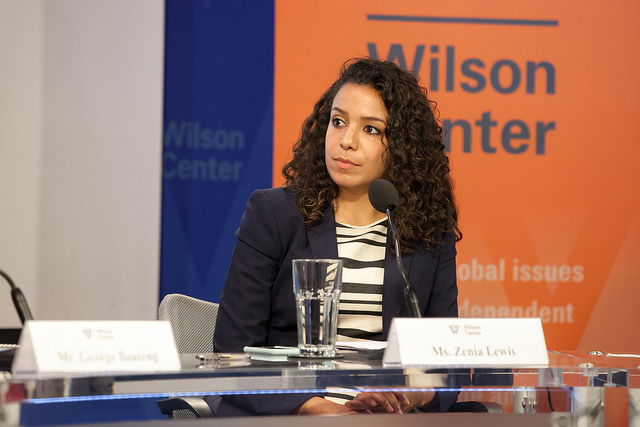
Zenia Lewis speaking on a panel at the Wilson Center on Africa.
Zenia Lewis’ 2008 summer internship in Malawi was supposed to be an opportunity for her to build upon what she had learned during her first year of a master’s degree in public policy from U-M’s Ford School, acquire a few new skills, and also experience working in a different cultural setting.
As expected, Lewis left Malawi 12 weeks later with several semesters worth of lessons. They just weren’t the ones she was anticipating.
As part of WDI’s Global Impact Summer Internships, Lewis arranged to spend three months working for the Malawi Rural Finance Co. The MRFC, for short, helps poor farmers and other small scale entrepreneurs by providing new kinds of access to savings and credit. It had intended to launch a new savings product to a group of interested farmers.
Lewis and others at MRFC planned to gather and analyze data on the individuals who opened these accounts, including well-being indicators such as income, health, and child education to measure the positive effects of the company’s work. They also had plans to roll out new biometric identification software, a modern-day credit bureau for tracking creditworthiness of clients who often lack official credentials and therefore are unable to secure loans or must pay higher interest rates to get one.
It all looked good on paper, but the roadblocks and challenges for Lewis started almost as soon as she arrived in the capital city of Lilongwe. First, many of the farmers who were supposed to participate in the new savings product backed out at the last moment due to a variety of cultural concerns. Then, delivery of the new software and hardware was delayed.
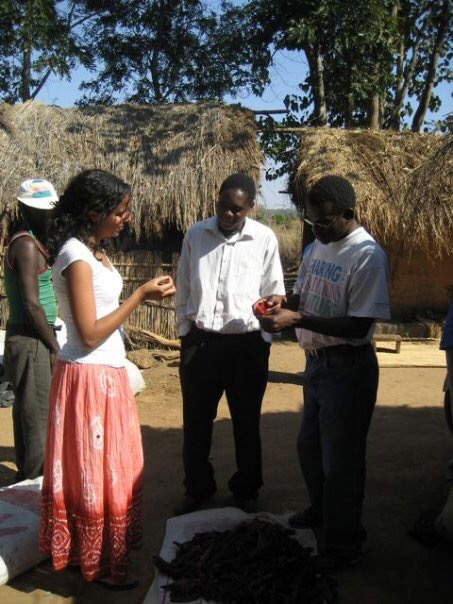
Lewis speaks with a paprika farmer in Malawi during her internship.
On top of those issues, MFRC’s offices had frequent power and internet outages as well as an insufficient number of computers, all of which stunted productivity. Lewis turned all of the issues into lessons.
“Learning early on that things can go completely awry in the field and take much longer than anticipated…was probably one of the most useful things I could learn for understanding the work I would do later in my career,” Lewis said. “It also taught me to be innovative, and to come up with new plans and solutions.
“It all served as a valuable lesson for later when doing research and working with partners in Africa because I understood firsthand many of the challenges they faced.”
Lewis adapted to her surroundings and circumstances. She took advantage of the delays and power outages to conduct face-to-face interviews with government officials and high-level individuals in the banking sector on how to improve microfinance policy and the feasibility of establishing a microfinance credit bureau in the country. She also went on field trips to more remote parts of Malawi to help improve loan collection and meet different small-business clients.
Along with the professional lessons, there were some personal enlightenments as well. For one, she discovered she didn’t like to be idle. So she began writing a blog, charging her laptop when the power was on and writing when there was a power outage.
“I learned that I actually enjoy adapting to new environments,” Lewis said. “I like challenging work situations that involve creatively coming up with solutions and I enjoy getting to know new cultures.”
Lewis took all her new wisdom into her professional career after graduation.
She began working for the Brookings Institution in Washington, D.C. and its Global Economy Program’s Africa Growth Initiative. She initially applied for a job there focused on Latin America, but the position had been filled. But when Brookings saw her experience in Malawi, it offered her a position with the Africa initiative. Lewis joined as a research analyst involved in a range of topics from political and governance issues to natural resource management – especially oil and gas – to trade and regional integration. She traveled to Ethiopia and Zambia for annual U.S.-Africa economic forums, and also worked on a project focused on the effects of oil and gas discoveries on local communities in Uganda.
Lewis left Brookings after nearly four years to move to Tunisia and work for the African Development Bank (AfDB) on a trade finance project that supported African banks lending to local small- and medium-sized enterprises that traded internationally. While there, she soon learned of a new position at AfDB in Washington working with the African Union and African ambassadors on engaging with the U.S. government on African development policy-related issues. She took the job and worked on several projects for about two years before leaving to volunteer in Lebanon assisting Syrian refugees.
Recently, Lewis got married and moved with her husband to Vienna. She is working on various consulting projects focused on African development issues, and is looking for a full-time position.
Wherever she lands, Lewis said she will bring with her the lessons learned from her summer in Malawi. She said she has often reflected on the challenges and hardships she endured during her internship whenever encountering tough times in her professional work.
“There have been some times when I’ve had to travel for work and experienced one chaotic thing after another and thought back to some of the challenges of that summer internship and reminded myself that it’s manageable and all will be fine,” Lewis said. “Also, when projects have had different roadblocks or not gone as planned, it’s been useful to think back and know that what can seem like a setback can actually be another opportunity or reveal useful insights for better implementing the project.”
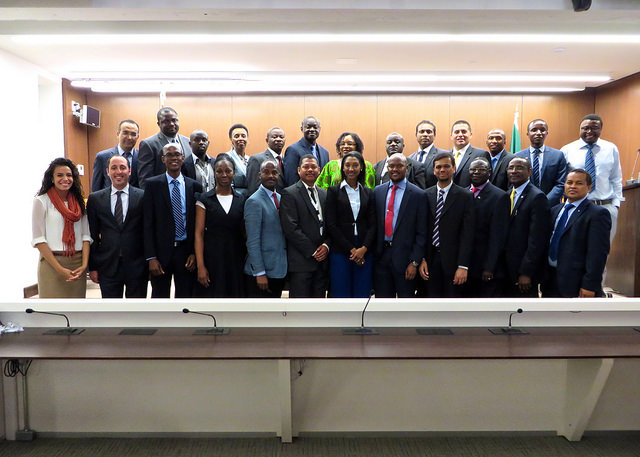
Lewis, far left, with officials from African embassies who attended a trade & investment session in Washington, D.C. organized by Lewis when she worked for the African Union.
Note: This is one in an ongoing series of articles profiling past WDI interns and Multidisciplinary Action Project (MAP) team members and their career paths. Additional profiles in the series may be found here.
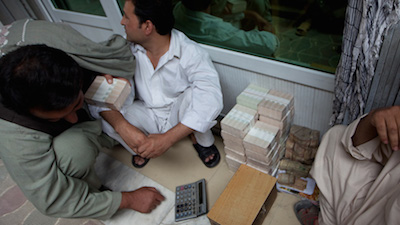
Stacks of cash are counted in an Afghan market.
NextBillion, the WDI-affiliated website focused on social entrepreneurship and venture development, has re-launched its financial inclusion blog with a new sponsor and a new name to better reflect the current thinking in the field.
The new site is called Financial Health and is sponsored by MetLife Foundation.
NextBillion Editor James Militzer said the term “financial inclusion” was fitting for the early days of the blog as the global community emphasized the need for wider access to financial services for underserved clients. But the sector’s focus has evolved over the years, with many now arguing that inclusion alone isn’t enough.
The latest thinking is that for people to be fully served by the financial services industry, access is only the beginning. People also must be able to balance income and expenses, accrue savings and handle debts, and have the tools to weather future financial storms.
“It has been fascinating to follow the evolution of financial inclusion in the four years since NextBillion launched our Financial Innovation blog,” Militzer said. “In that short time, the sector has really come into its own. But with the focus shifting from outputs, like the number of new accounts opened or used, to the actual impact of financial services on clients’ lives, it feels like the movement is undergoing a sea change. We’re looking forward to working with MetLife Foundation, their partner organizations, and our broader community of contributors around the world to chronicle the effects of these changes on financial services providers and their low-income clients.”
The MetLife Foundation has been an advocate for increased access to financial products for underserved populations. In a Q&A with Militzer, foundation President Dennis White talks about the organization’s work, the outlook for financial services in low-income communities, and his hopes for the site.
“We’d like it to be a site where people can go to find out what’s working, and importantly, what’s not working,” White said. “There needs to be an opportunity for both the good, and the not-so-good, to be discussed. And that’s incumbent upon funders and others in the field to make sure that’s shared.”
Photo courtesy of the Institute for Money, Technology and Financial Inclusion, via Flickr
As the academic year comes to a close, the 13 MAP teams organized and funded by WDI have finished their projects and successfully delivered final reports to their sponsoring organizations.
Multidisciplinary Action Projects, or MAP for short, is an annual, action-based learning course offered at the Ross School of Business in which MBA students work on projects for organizations all over the world under the guidance of faculty advisors. Each project requires analytical rigor, critical thinking, and teamwork among students. Sponsoring organizations receive first-rate deliverables and data-driven recommendations from the teams of students. (Learn more about this year’s MAP projects organized by WDI here; find more information on WDI’s MAP projects over the years here.)
After learning about their projects and conducting secondary research for several weeks, the students then spend two to four weeks working with their organizations in the field.
Two of those projects – in Hanoi, Vietnam and Madurai, India – focused on laying the groundwork for centers designed to support local entrepreneurs and are part of a joint effort between WDI and the Zell Lurie Institute (ZLI). To assist the students on their projects, WDI Education Initiative Vice President Amy Gillett and Program Coordinator Nathan Rauh-Bieri provided advice and guidance based on WDI’s prior work in entrepreneurship development (see WDI’s newly-launched Entrepreneurship Development Center).
Here is a recap of the two projects.
The Vietnam Partners MAP project was co-funded by ZLI, and hosted by Vietnam Partners, LLC. The project’s goal was to create a launch plan for an entrepreneurship service center in partnership with Hanoi Business School (HSB). The student team conducted more than 45 interviews with entrepreneurs, HSB administrators, and other stakeholders. They discovered that Vietnam’s entrepreneurs need help growing their business – not just starting them – and would welcome an entrepreneurship development center.
“The environment in Vietnam is ripe for this kind of organization,” said Bradley LaLonde, the team’s supervisor at Vietnam Partners.
At the end of their project, the students presented a business plan for a Center for Entrepreneurship and Innovation at HSB. The team identified a local hunger for practical rather than theoretical training, and training customized to the local ecosystem. More specifically, the MAP team identified a lack of local business cases. After a conversation with WDI, the MAP team suggested that a sustained effort around creating local cases, similar to WDI’s Philippines Case Collection, could be high-potential way to train Hanoi’s practice-hungry entrepreneurs.
Team member Juan Recalde said the project taught him that entrepreneurs have different needs.
“That was a very important learning because we could segment different types of entrepreneurs and based on the segmentation, determine which segment to target,” he said.
Recalde said he will take what he learned – specifically market research and creating a launch strategy for an entrepreneurship development center – and try to replicate it in his hometown.
“Formosa is one of the poorest provinces of Argentina and the government plays a big role in the economy, while the private sector is small,” he said. “I believe that entrepreneurship is the answer to the growth issues that my province faces.”
Stewart Thornhill, executive director of ZLI and the team’s academic advisor, praised the team for how well they represented U-M, WDI and ZLI and for their mature analysis of the project.
“They didn’t treat entrepreneurs as a generic class, but were able to identify specific personas,” he said. “Their in-depth qualitative research will serve this center’s clients well in the future.”
WDI President Paul Clyde, who also advised the team, said they gave Vietnam Partners good insights into the current situation with the country’s entrepreneurs.
“There is no substitute for having information from people who have spent time on the ground to get a good feel for what is going on,” Clyde said. “This is exactly the type of situation in which MAP projects are effective tools for us and for sponsors.”
The MAP team, based in Madurai, India, was tasked with setting up a business model for Aparajitha Foundation to provide services to the city’s Madurai’s micro, small, and medium enterprises – or MSMEs. This work builds on last year’s MAP project with Aparajitha.
The student team’s final report outlined the gaps in the entrepreneurial ecosystem in Madurai, the market opportunity, business model, financial model, implementation plan, and key learnings. The team recommended that GROW, a conceptual organization to meet the needs of growth-stage entrepreneurs, be launched. The students also provided an outline of what was needed to have GROW operating within two years and expand to a second locale within five years.
Clyde, the team’s academic advisor, lauded the students’ efforts.
“They were able to get up to speed quickly on the current situation and combined that with some careful thinking about different models for providing services to entrepreneurs,” he said. Aparajitha “has already made significant progress in (its) engagement with the entrepreneurs in Tamil Nadu.”
The project left a definite impression on team member Nancy McDermott, who, though having a background in the community development aspects of business, experienced “what a big impact supporting entrepreneurs locally has on the local economy.”
Particularly, the project’s scope exposed her to how entrepreneurship can “spark job creation at a grassroots level,” she said, adding that she saw “what a big impact this is having on Madurai’s economy, and what kind of impact it can have on other economies as well.”
This summer, a WDI intern will pick up where the student MAP team left off and develop diagnostic tools that will identify the challenges a given entrepreneur faces and thus how GROW can work with the entrepreneur most effectively.
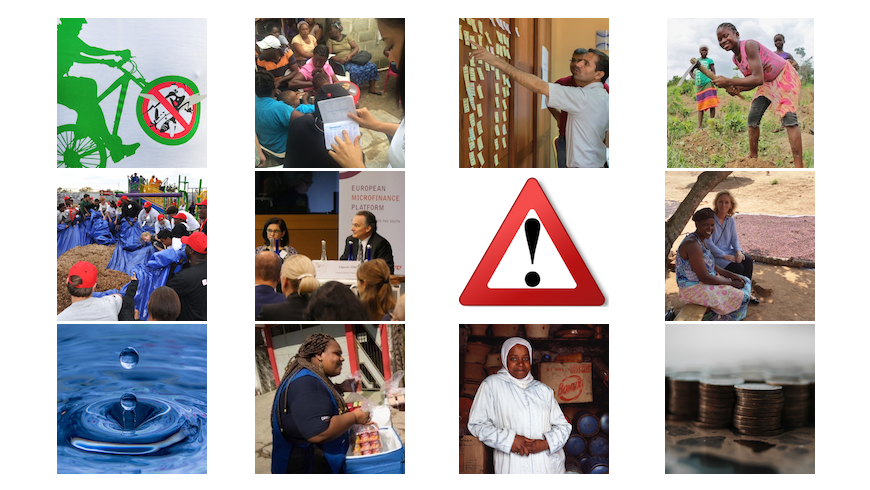
NextBillion.net, an affiliate site of WDI, conducted its Most Influential Posts of 2016 contest during the holiday break. Nearly 2,500 votes were cast in the fifth annual contest, which re-published the most popular posts for each month of 2016. Readers voted for the blog articles that made a difference in their work toward advancing market solutions to poverty. NextBillion Editor James Militzer authored the following post announcing the winners of the contest.
Web publishing can be a mysterious business. Try as you might, you can never quite predict what the Internet will react to – and when a post takes off, you’re often not sure why. Are people drawn in by the catchy headline? The newsworthiness of the topic? The quality of the writing and analysis? Or something else entirely?
A combination of those factors likely drew readers to the three winners of NextBillion’s “Most Influential Post of 2016” contest. Each of our top three vote-getters brought a unique mixture of topicality, engaging writing and thought-provoking analysis – and they each tackled some of the most important issues facing the social business world in the past year.
IN FIRST PLACE WITH 46 PERCENT OF THE VOTES
Finding the Right Last-Mile Distribution Model
The key to successful writing may boil down to a simple rule of thumb: Know your audience. This much-read post from Jona Repishti at MIT D-Lab’s International Development Innovation Network is a case in point. Many NextBillion readers are entrepreneurs striving to bring their products to emerging markets, and Repishti tackled one of the topics nearest to their hearts: The persistent challenges of bridging the last mile.
To that end, she shared the findings of a working group formed by MIT D-Lab’s Practical Impact Alliance (PIA) that focused on two key questions: 1) What is the best way to select a distribution network model?; and 2) What is the best way to set up a door-to door distribution channel? Including consumer goods companies like Danone and Johnson & Johnson, NGOs like World Vision and Grameen Foundation, and social ventures like Greenlight Planet and Living Goods, the working group shared 14 case studies and generated a 43-page guide called Best Practices for BoP Door-to-Door Distribution. Repishti summarized these findings and resources in this must-read post – and added an important caveat for any enterprise trying serve the world’s most hard-to-reach customers: “As challenging as it is to reach rural consumers, access does not equate with success.”
IN SECOND PLACE WITH 43 PERCENT OF THE VOTES
What We Know – and Don’t Know – About Zika and Its Treatment
NextBillion has had many well-read and widely shared posts over the years, but we’d never seen anything like this post from Dr. Melvin Sanicas, then at the Bill & Melinda Gates Foundation. There’s a dedicated online audience for social business coverage, but you don’t often see a post in our space truly “go viral.” Yet Sanicas’ rundown of the medical and business repercussions of the Zika virus could not have been more timely – it came out at the peak of media hype around the outbreak and quickly garnered over 100,000 views, making it NextBillion’s most-read post of all time.
Sanicas’ clear-eyed view of the Zika landscape provided a welcome counterbalance to some of the online hysteria about the virus. He shared the scientific consensus on Zika’s effects and discussed the implications of the disease’s disturbing spread, along with some innovative potential solutions. He also provided an update on the efforts of governments, biotech firms and academic labs to quickly bring a vaccine to market – and raised a possible complication: “While the hype and excitement from investors are understandable, it is important to keep things in perspective. Epidemic threats do not always turn into profits for developers.”
IN THIRD PLACE WITH 3 PERCENT OF THE VOTES
Though this post by V. McIntyre, a London-based freelance writer working with Harvard’s Kennedy School, was first published in March, it continued drawing strong traffic throughout the year. Well into the fall, it still regularly popped up on our list of trending posts – an unusual feat for months-old content.
What accounted for its enduring appeal? If I had to take a guess, I’d say that McIntyre piqued readers’ interest by adding a dash of mystery to a vital but familiar topic. He framed the post around a surprising finding: A number of rigorous studies have shown that large increases in income and consumption happen fairly rapidly after people gain access to a savings account. In fact, these increases come much faster than one would expect, if they had been due to additional investments enabled by savings.
What could be driving this? McIntyre explores an intriguing explanation highlighted by recent research: “Apparently, when people are given the means to save, they start working harder to have more money to deposit into the account. … Perhaps savings accounts don’t enable people to earn more, they inspire them to earn more.”
NextBillion would like to congratulate our winners and finalists in this competition, and thank everyone who voted. And as the new year begins, we’d like to thank all our guest writers and readers – we are truly grateful for your dedication not only to advancing the work of social business, but to sharing your challenges, insights and achievements on platforms like ours. We wish you every success in 2017
In an article published in the November 2016 issue of ISE Magazine, WDI’s Ted London and Colm Fay discuss how standardized frameworks can help create sustainable businesses for the base of the pyramid in developing countries.
This article is provided with permission of the Institute of Industrial and Systems Engineers from the November 2016 issue of ISE, Copyright©2016 Institute of Industrial and Systems Engineers. All rights reserved.
Amy Gillett discusses development through entrepreneurship in an interview on enterprises’ role in alleviating poverty in the newsletter of Education partner Pontis Foundation.
After graduating from the University of Texas, Patrick Huang began his career as a management consultant while giving free advice to social entrepreneurs in emerging markets. But he soon wanted to do much more than dole out advice on the side, so Huang decided to get his MBA and join a social impact enterprise in an emerging market.
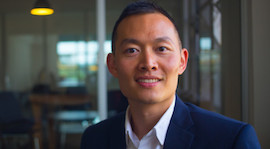
The Ross School of Business at the University of Michigan was at the top of Huang’s list of graduate schools, and “WDI was one of the key reasons,” he said.
“Ross and WDI stood out when I was applying because of its dedicated focus on the (base of the pyramid) in emerging markets through thought leadership and opportunities for students to engage directly in emerging markets through (student projects) and internships,” said Huang, now working with a startup enterprise in Kenya.
He enrolled at Michigan Ross in fall 2011 and that winter took part in a WDI-sponsored Multidisciplinary Action Project (MAP), an action-based learning course in which students work for a company or organization on a special task.
He was part of a four-person team working for the nonprofit charity CARE in Bangladesh, which was tasked with developing a micro-franchise pilot for small-scale businesses that sell agricultural inputs such as seed and medicine for livestock. The business plan included consolidation and coordination to improve efficiencies at the companies.
The team worked in a small farming town a few hours outside the capital of Dhaka. They often sat in huts and interviewed farmers and business owners.
“Although our team and our interviewees came from different sides of the world, we found common ground as we came to understand their challenges, their struggles, and most importantly, their ambitions for a better life,” Huang said.
That summer, he traveled to Mumbai, India as a WDI intern working for Village Capital, a peer-led business accelerator and investment program for early-stage social enterprises. Village Capital was planning to start two business accelerator programs, one focused on enterprises based in Mumbai and another sector-specific program for enterprises across India. Huang’s job was to recruit interested and qualified social enterprises across India to the program.

Huang poses with an elephant during his internship in India.
Huang soon discovered he not only had a knack for identifying potential businesses, he enjoyed it. He met with budding business owners, angel investors, and entrepreneur associations. He would meet them for coffee at a local cafe or for drinks during happy hour. He learned about each enterprise’s team, its business model and plans for growth.
“At the same time, I also learned about the city, the people, the culture,” he said. “I traveled across India from historical sights like the Taj Mahal to tea plantations in Kerala, absorbing and trying as much as I could. I sought to not only identify prospective businesses but also refine my own interests.”
By summer’s end, Huang had conducted preliminary due diligence and created a pipeline of 45 prospective early-stage, social enterprises.
“More importantly, I knew that I wanted to work in this environment where the growth of the entire country was almost tangible,” he said.
After graduating in 2013, Huang moved to Nairobi to work as a consultant for small- and medium-sized enterprises (SMEs). He now is chief of staff and principal business development officer at Umati Capital, a financial technology startup that provides financing alternatives for SMEs in agri-business, retail suppliers and consumer goods manufacturers in East Africa.
He said his WDI internship and MAP experiences “refined and strengthened my current passion for entrepreneurship as the driver for economic growth in emerging markets.” He also identified his role in this field – finding areas of collaboration and opportunity.
But to accomplish this with prospective clients in Kenya, he thought back to what he learned during those meetings over coffee in Mumbai and the interviews with farmers in their huts in Bangladesh. What made those projects succeed was Huang’s humility and empathy when interacting with people from a different culture or background. He also practiced “active listening” to show he was attentive and striving to understand. These are traits he applies in his work today.
“Only by understanding these lessons could I identify the common ground that served as our foundation to work together and achieve a common goal,” he said. “With my Ross MBA and my experiences at WDI, I am grateful for that opportunity, and look forward to working with businesses that can generate value for both the shareholders and the society as a whole.”
Note: This is one in an ongoing series of articles profiling past WDI interns and Multidisciplinary Action Project (MAP) team members and their career paths. Additional profiles in the series may be found here.
The Ethiopian diaspora living in the United States have a strong motivation to engage with their homeland. However, they lack information on how to invest and what specifically to invest in. The Ethiopian diaspora are investing in the Ethiopian economy and, if properly engaged, may be willing to invest more and more productively. This Multidisciplinary Action Project (MAP) helped an Ethiopian bank identify the best ways to capitalize on the investment interests of Ethiopians living in the United States through various diaspora financial products. The project focused upon ways to increase diaspora investment with the goals of increasing access to capital for the SMEs. Through both primary and secondary research, the project involved extensive information gathering around the needs and desires of Ethiopian diaspora living in the U.S. and the state of Ethiopian economy with focus on the banking environment, credit market and state of SME funding. Based on market research, the student MAP team recommended two financial products and two implementation strategies for the bank to penetrate the diaspora marketplace.
A supply chain is only as effective as the last mile. That’s why an adequate and reliable flow of funding all the way to the point of care, also known as the “last mile,” is vital to an effective immunization supply chain. A new WDI policy paper examines how financial structures can impact vaccine supply chains and also highlights tools for improvement.
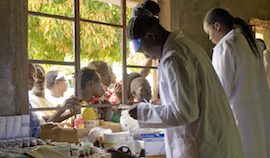
The paper, “Delivering the Money: The Importance of Efficient Financial Flows for Vaccine Distribution,” complements a new study by VillageReach and UNICEF identifying key financial barriers preventing or delaying vaccines from reaching the last mile. Because of WDI’s broad experience in global supply chain issues from its work on many projects around the world, VillageReach asked if the Institute would conduct a full review of the literature and desk research for a policy paper to accompany its study, which focuses on conditions in Mozambique.
The paper is the sixth in a series produced by VillageReach to develop intellectual capital for increased access to essential medicines, vaccines and other health technologies in developing countries. Additional papers in this series consider the different components of the supply chain, the challenges faced at the last mile for distribution, and examples of innovative approaches to address those challenges.
“The purpose of our policy paper is to take some of the work they’re doing in Mozambique and apply a more global context to it,” said author Michael Krautmann, a WDI research associate specializing in healthcare supply chains. “Are other countries experiencing similar problems as well? What are other countries doing to address these issues within the context of global health?”
Krautmann, along with Maria Joachim, a PhD candidate at the University of Michigan School of Public Health and WDI research assistant, extensively reviewed the literature on public financial management as a concept from sources such as the World Bank and the International Monetary Fund. But when it comes to how public finance successfully intersects with public health, the team discovered a dearth of research.
“We focused on condensing the literature that was available to provide a realistic path forward for these vaccine managers in the districts, the ones who face these issues,” Krautmann said. “We tried to address what vaccine managers can do to improve the flow of funds for vaccines in spite of whatever financial management issues they may face.”
A couple of recommendations include advocating at all levels of government for distribution support and budget clarity, and measuring and tracking distribution costs.
In addition to targeting the on-the-ground managers, Krautmann said the paper’s other audience includes global and national-level donors and policymakers, “who may be focused on problems higher up in the global health supply chain.
“This paper hopes to highlight the issue of efficient last-mile financial flows so it can be put on the global healthcare agenda and ultimately addressed,” he said.
Photo courtesy of U.S. Army Africa Public Affairs.
NextBillion, one of the internet’s first media sites focused exclusively on social entrepreneurship and base of the pyramid venture development, recently celebrated 10 years online. As NextBillion’s parent organization for nearly half of that time, WDI sees a bright future for the site, which serves as a one-stop destination for in-depth original articles, curated news stories, career listings and important events across the broad spectrum of market solutions to poverty.

Launched in mid-2005, NextBillion was born out of “The Next Four Billion report,” one of the first academic studies to quantify the base of the pyramid market. The World Resources Institute, which published the report authored by Al Hammond, created NextBillion to facilitate discussions around the research. The site soon caught on, establishing a global community where entrepreneurs, academics, business leaders, NGO managers, global development agencies, students and policy makers converged around a shared goal, which later became NextBillion’s tagline: “Development Through Enterprise.”
Each year, NextBillion publishes hundreds of contributed articles and nearly as many job ads. Editors aggregate thousands of news stories and press releases, and post hundreds of important events on NextBillion’s calendar, such as conferences, workshops and webinars. They also provide live coverage and interviews at several key events each year. The detailed content on NextBillion drives knowledge and understanding in many sectors, including agriculture, healthcare, energy, technology, impact assessment and financial access. NextBillion contributors also delve deeply into the business models, affordable products, breakthrough technologies, investment strategies and private-public partnerships helping to change the economic fortunes of billions of people making a few dollars a day or less.
WDI’s formal involvement with NextBillion began in 2010 when it joined the World Resources Institute as a co-partner in the site. Two years later, WDI acquired NextBillion from WRI and has continued to manage the site as its parent organization. NextBillion’s editorial focus aligns well with WDI’s mission as a research and educational organization focused on providing private-sector solutions in emerging markets.
“NextBillion is different from other publications and media sites, in part, because of our focus on the practitioner who is working to create a more inclusive global economy,” said Scott Anderson, who has been managing editor since 2010. “Our contributors share a broad range of experiences and skill sets, from idea stage entrepreneurs to senior managers of Fortune 500 companies. Regardless of their titles or career paths, NextBillion is a place for these people to share and collaborate over business solutions to poverty-driven challenges.”
The NextBillion team also includes James Militzer, editor of NextBillion Financial Innovation, and Kyle Poplin, editor of NextBillion Health Care. They joined NextBillion to help the site provide even more comprehensive coverage of key sectors in social business through two topical sub-blogs. The first was NextBillion Health Care, which was launched in 2012 to explore new thinking, business models and technologies designed to improve people’s health and increase access to care. The second, launched in 2013, was NextBillion Financial Innovation, a blog and news resource dedicated to improving financial access for low-income people around the world. In addition, NextBillion also produces in-depth video interviews, extensive blog series and e-book collections that provide background and context for readers who want to explore issues more deeply.
“It has been very gratifying to watch the social business movement growing in tandem with NextBillion,” Militzer said. “While in our early days NextBillion was one of the only websites specializing in social enterprise, we’ve seen remarkable growth in both the sector and the media ecosystem that covers it. As we look toward our next decade online, we’re constantly exploring new ways that NextBillion can keep our dedicated readers informed, while familiarizing the broader public with the world of social business.”
“We take great pride in being a resource not just for creative thinkers, but for risk-taking do’ers,” Poplin added. “As an editor, it’s a treat to interact with and learn from people who want to make a positive difference in the world.”
NextBillion has served as a platform for discussion and debate, even when the criticism has turned to issues at the heart of the site itself. Over the years, contributors have questioned the effectiveness of base of the pyramid theory and business practices, as well as that of microcredit, for example. NextBillion also has published numerous articles and introspective blog posts from entrepreneurs and managers whose businesses or initiatives have failed, discussing what they have learned from the experience.
In the years since NextBillion joined WDI, traffic for the site has more than doubled and its social media following has grown exponentially. NextBillion now has more than 43,000 Twitter followers and over 11,000 on Facebook and LinkedIn.
While WDI contributes articles and serves as the parent organization, NextBillion retains editorial independence. The site also welcomes partnerships with organizations interested in promoting, shaping and participating in dialogue relevant to development through enterprise. With a dedicated audience and a social media community growing at more than 15 percent annually, NextBillion offers partners an effective dissemination platform to share knowledge and discuss the impact of their work.
NextBillion unveiled an all-new design in November 2015 that made the site easier to navigate and to share content.
“In the coming months and years, we hope to make the experience of connecting, sharing and contributing content to NextBillion even more valuable to our readers and to the development through enterprise community,” Anderson said.